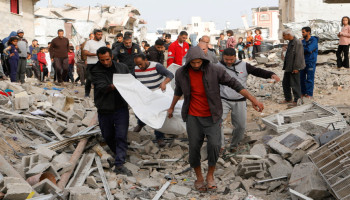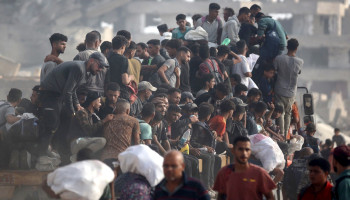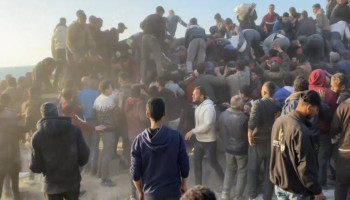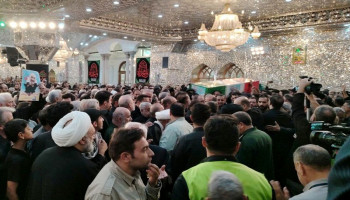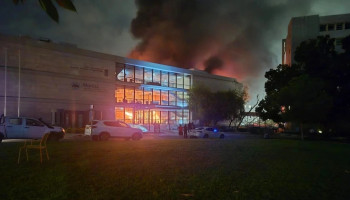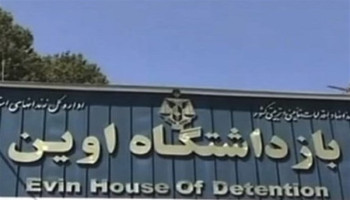Iran has held a grand funeral service for those martyred in the 12-day aggression by Israel and the US against the Islamic Republic.
The funeral in capital Tehran for 60 nuclear scientists, military commanders and civilians martyred in Israeli strikes began at 8:00 am (0430 GMT) in Enqelab Square on Saturday, proceeding to Azadi Square, about 11 kilometers across the sprawling metropolis.
A huge crowd of mourners participated in the procession, accompanying coffins with chants of "death to Israel" and "death to America" and carrying placards.
"Boom boom Tel Aviv," read one banner, referring to Iranian missiles fired at Israel during the conflict in retaliation for its attacks on Iran.
Iranian President Masoud Pezeshkian, along with other senior government officials and military commanders including head of the Quds Force Brigadier General Esmail Qa’ani, also attended the event.
Foreign Minister Abbas Araghchi said the martyred Iranians had given their "blood" during a 12-day war with Israel but "not honor".
"Iranians gave blood, not land; gave their loved ones, not honor; they withstood a thousand-ton rain of bombs, but did not surrender," he said on his Instagram account, adding that Iran does not recognize the word "surrender”.
Foreign Ministry spokesman Esmaeil Baghaei, who attended the procession, paid flowing tributes to the martyrs in a message on X.
“Today, the zealous people of Iran carry on their shoulders, with heavy sorrow but standing steadfast and powerful, some of their purest and most patriotic sons and daughters - commanders, elites, athletes, women and children of this land - who were martyred during the war imposed by the aggressor Zionist regime, and with indescribable respect, they lay them to rest on the soil of their homeland like mythical heroes; so that each one may become a seed for the growth of other heroes," he wrote.
Images showed coffins draped in Iranian flags and bearing portraits of the martyred commanders in uniform near in the iconic Enqelab Square in central Tehran.
Mohsen Mahmoudi, head of Tehran's Islamic Development Coordination Council, called it a "historic day for Islamic Iran and the revolution".
Among the martyrs is Mohammad Bagheri, a major general and the second-in-command of the armed forces after the Leader of the Islamic Revolution Ayatollah Seyyed Ali Khamenei.
He will be buried alongside his wife and daughter, a journalist for a local media outlet, all martyred in an Israeli attack in Tehran.
Nuclear scientist Mohammad Mehdi Tehranchi, also martyred in the savage aggression, will be buried with his wife.
Chief commander of the Islamic Revolution Guards Corps (IRGC) Major General Hossein Salami, who was martyred on the first day of the unprovoked aggression, will also be laid to rest after Saturday's ceremony — which will also honor at least 30 other top commanders.
Of the 60 people who are to be laid to rest after the ceremony, four are children.
Iranian officials say more than 600 people, mostly civilians, were martyred in Israeli and US aggression against Iran.
The ceremony coincides with the second day of the Islamic month of Muharram, which commemorates the martyrdom of Imam Hussein (AS), the third Shia Imam, and his 72 companions.
In 680 AD, Imam Hussein (AS) and his followers fought bravely for justice against the much larger army of the Umayyad caliph, Yazid I, in the Battle of Karbala, in southern Iraq.
“Iranians have proven that they are the nation of Imam Hussein; a nation that, in the battle of truth against falsehood, relying on faith, steadfastness, and national solidarity, has the ability to overcome any evil," Baghaei wrote.
In a statement, the Foreign Ministry said the funeral was not “just a farewell ceremony; it was a demonstration of the unity of a nation that responded to terror with the language of presence”.
It hailed Iran as “a nation that has been tested many times on the path of independence, freedom, and dignity and has emerged victorious”.
“This steadfast presence is not only a sign of the people's loyalty to the path of sacrifice and resistance for the homeland and dignity of the people of Iran, but also sends a clear message to the world: the people of Iran are turning threats into unity, and war into an opportunity to realize a national will and continue on the path,” it added.
Source: Press TV

